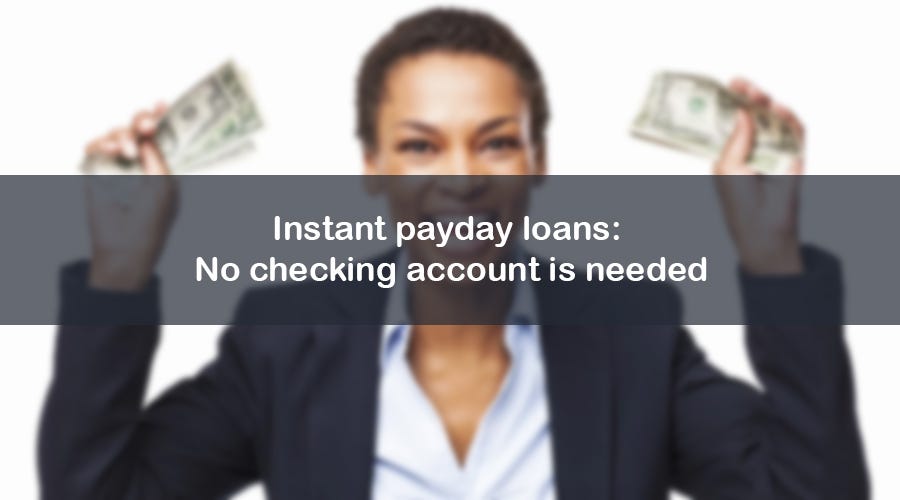Payday Loan Without Direct Deposit Required

For millions of Americans living paycheck to paycheck, even a minor unexpected expense can trigger a financial crisis. The reliance on short-term, high-interest loans, often referred to as payday loans, has become a contentious issue, particularly for those without traditional bank accounts. A growing segment of the industry now offers "payday loans without direct deposit required," promising quick access to cash without the need for a bank account.
This development raises critical questions about financial inclusion, predatory lending practices, and the overall impact on vulnerable populations. While these loans offer immediate relief to some, they also carry the risk of trapping borrowers in a cycle of debt, particularly when traditional safeguards like direct deposit verification are absent.
Understanding Payday Loans Without Direct Deposit
Payday loans without direct deposit operate much like traditional payday loans, offering small amounts of cash intended to be repaid on the borrower's next payday. The key difference lies in how the funds are disbursed and repaid. Instead of requiring a bank account for direct deposit and withdrawal, these lenders typically offer alternative methods such as cash, prepaid debit cards, or money orders.
The absence of a direct deposit requirement ostensibly expands access to credit for the unbanked and underbanked populations. According to the Federal Deposit Insurance Corporation (FDIC), millions of Americans lack a bank account, often citing reasons such as high fees, lack of trust in banks, or unstable income.
The Appeal of No Direct Deposit Loans
The primary appeal of these loans is their accessibility and speed. Borrowers facing urgent financial needs, such as a car repair or medical bill, can often secure a loan within hours, bypassing the lengthy application processes associated with traditional bank loans.
The lack of a credit check, or a limited credit check, is another draw for individuals with poor credit histories. Lenders often prioritize a borrower's income and ability to repay the loan over their creditworthiness.
The High Cost of Convenience
Despite their accessibility, payday loans without direct deposit are notoriously expensive. Interest rates, often expressed as an Annual Percentage Rate (APR), can soar into the triple digits, far exceeding the rates charged by banks and credit unions.
These high costs are compounded by short repayment periods, typically two weeks or less. Borrowers who are unable to repay the loan in full on their due date face the option of rolling over the loan, incurring additional fees and interest charges.
The Risks of Debt Traps
The combination of high interest rates and short repayment periods creates a significant risk of debt traps. The Consumer Financial Protection Bureau (CFPB) has extensively documented the cycle of debt that can result from payday lending, with many borrowers repeatedly renewing or reborrowing loans.
Without the direct deposit mechanism, lenders may have less visibility into a borrower's overall financial situation, potentially increasing the risk of lending to individuals who are already overextended. Repayment becomes even more challenging when borrowers must physically visit a store to repay their loans.
Alternative Lending Options
Given the risks associated with payday loans, financial experts often advise exploring alternative lending options. Credit unions, for example, may offer small-dollar loans with lower interest rates and more flexible repayment terms.
Community development financial institutions (CDFIs) are another valuable resource, providing financial services and loan products to underserved communities. These institutions often prioritize financial education and responsible lending practices.
Negotiating payment plans with creditors, seeking assistance from local charities, or exploring government assistance programs are also viable alternatives to payday loans. It is crucial to evaluate the long-term financial implications of any borrowing decision.
The Regulatory Landscape
The regulation of payday lending varies significantly across states. Some states have banned payday lending altogether, while others have imposed strict interest rate caps and other consumer protections. The lack of federal regulation allows for a patchwork of state laws, creating challenges for both lenders and borrowers.
The CFPB has attempted to establish national standards for payday lending, but these efforts have faced legal challenges and regulatory changes. The debate over the appropriate level of regulation continues, with consumer advocates arguing for stronger protections and industry representatives advocating for greater flexibility.
"Payday loans are not a sustainable solution for long-term financial challenges," warns a representative from a non-profit financial counseling agency. "Borrowers need access to affordable credit and financial education to break the cycle of debt."
The Impact on Unbanked Communities
The availability of payday loans without direct deposit disproportionately affects unbanked communities. These communities often face limited access to traditional financial services and may be more vulnerable to predatory lending practices. Studies have shown that unbanked households are more likely to use alternative financial services, such as payday loans, check cashing services, and pawn shops.
Addressing the root causes of unbankedness, such as high bank fees and lack of trust, is crucial for promoting financial inclusion and reducing reliance on high-cost credit products. Initiatives that promote financial literacy and provide access to affordable banking services can help empower individuals to manage their finances effectively.
The Future of Payday Lending
The future of payday lending remains uncertain. Technological advancements, such as mobile banking and online lending platforms, are transforming the financial landscape. These developments could potentially increase access to affordable credit for underserved communities, but they also carry the risk of exacerbating existing problems.
As the industry evolves, it is essential to prioritize consumer protection and ensure that vulnerable borrowers are not exploited. Increased transparency, responsible lending practices, and robust regulatory oversight are crucial for creating a fair and equitable financial system.
Ultimately, addressing the underlying economic challenges that drive demand for payday loans is essential. Policies that promote job creation, raise wages, and expand access to affordable healthcare and housing can help reduce reliance on high-cost credit and improve the financial well-being of all Americans. Financial literacy and responsible financial planning should be accessible to everyone.









.jpg)








